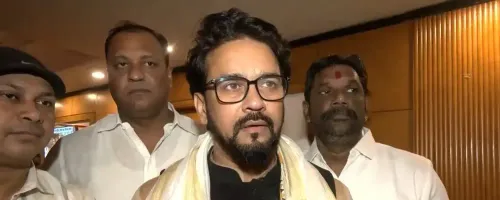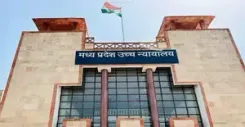Rajasthan CM Claims Waqf Act Will Safeguard Rights of Impoverished Muslims

Synopsis
Key Takeaways
- The Waqf Act aims to protect impoverished Muslims' rights.
- It includes due process with a 90-day notice for Waqf claims.
- Revenue from Waqf properties will benefit the Muslim community.
- Opposition to the Act is seen as self-serving.
- Calls for transparency in Waqf resource utilization.
Jaipur, April 16 (NationPress) The Chief Minister of Rajasthan, Bhajan Lal Sharma, asserted on Wednesday that the Waqf Act is designed to safeguard the rights of impoverished Muslims while also playing a role in curbing unlawful land encroachments.
“This new Waqf Act will defend the rights of underprivileged Muslims, particularly women, and will ensure that a formal procedure is followed, including a 90-day notice period, before any claims related to Waqf properties are made. This will help in preventing illegal encroachments and securing rightful ownership,” the Chief Minister stated during a BJP workshop at the party headquarters in Jaipur.
Sharma further emphasized that the revenue generated from verified Waqf properties will be utilized exclusively for the welfare of the Muslim community.
“Those who oppose this legislation are not doing so out of genuine concern for Muslims but rather to protect their own interests,” the Chief Minister argued.
He also accused the Congress and other opposition groups of consistently resisting constructive reforms, recalling similar apprehensions that arose during the introduction of the Citizenship Amendment Act (CAA), which he claimed turned out to be unfounded.
In an additional statement, Radha Mohan Das Agarwal, in charge of the state BJP, mentioned that under the leadership of Prime Minister Modi, 15 percent of the Muslim population has reaped 70 percent of the benefits from various government initiatives.
“During the Congress administration, Muslims were relegated to low-paying jobs like puncture repair. The community must reflect on who is truly accountable for this situation,” he remarked.
BJP state president Madan Rathore claimed that the new Waqf Act aims to elevate the status of poor Muslims and urged party members to counter the opposition’s “propaganda” with factual information.
“Prior to 2014, the Congress instilled fear that the BJP would adversely affect Muslims. However, after 11 years of BJP governance, Muslims have progressed and benefited from every significant scheme. While the Congress views Muslims merely as a vote bank, the BJP respects them as valued citizens of India,” Rathore asserted.
He also highlighted the underutilization of Waqf assets, noting that despite possessing substantial resources, the Waqf Board has not effectively utilized them for community welfare.
He called for transparency and proper management of Waqf assets to benefit orphans, marginalized Muslims, widows, and divorced women.
The event featured the attendance of BJP National Minister Alka Gurjar, Deputy Chief Minister Premchand Bairwa, Education Minister Madan Dilawar, Law Minister Jogaram Patel, Rajya Sabha MPs Ghanshyam Tiwari and Rajendra Gehlot, former state chief Arun Chaturvedi, former Leader of Opposition Rajendra Singh Rathore, and others.
The program was introduced by former Union Minister Kailash Chaudhary, with BJP state Vice President Mukesh Dadhich overseeing the proceedings.
Hamid Khan Mewati delivered the closing remarks.









